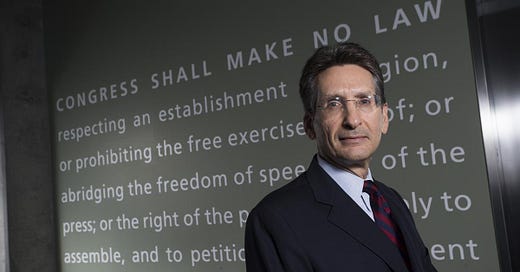Five Questions About Cameras in the Courts with Media Lawyer David Bodney
Should Judge Chutkan televise proceedings in the Trump case?
The issue of whether the federal judiciary should permit cameras in the courtroom has surfaced before Judge Tanya Chutkan in the District of Columbia. Lawyers representing media outlets have asked her to permit cameras when the criminal case against Donald Trump goes to trial. We are incredibly lucky to have media lawyer David Bodney with us tonight to help us understand the issues.
David founded the media law group at Ballard Spahr, a Philadelphia-based law firm with more than 600 lawyers in offices nationwide. David's practice is focused on constitutional issues, and in particular, on cases designed to give the media access to government proceedings and to prevent prior restraints on reporters. His law firm is in the thick of the proceedings to convince Judge Chutkan to give members of the public broad access to the trial of the former president even if they can’t be physically present in the courtroom.
Their application, on behalf of a group of media organizations, is one of two that has now been filed in an effort to persuade the Judge to permit televised coverage or a suitable alternative. They argue that the public has an undeniable constitutional right to follow the Trump trial. They reject the notion that “clunky video cameras and bright lights” could interfere with a defendant’s due process rights—a rationale used by the Supreme Court in a 1965 case to refuse permission for cameras in the courtroom—by pointing out that modern technology allows news organizations to provide access to court proceedings with minimal, if any, disruption.
Trump’s reply was due today, but the court has been advised he will not file one. The Special Counsel’s office did, however, citing the existing rule in federal courts that prohibits the use of cameras in the courts. They argue that the undeniable public interest in Trump’s case doesn’t override the concerns underlying the federal rule. The government fears the potential for social media to impact witness testimony and juror security. But those concerns seem misplaced, since, if the proceedings aren’t televised, Trump or others in his camp will still advance their version of them across social media, and others in the courtroom will be free to do so as well. Keeping cameras out of the courtroom won’t prevent Trump from trying to posture for the press or intimidate people involved in the trial if he is so inclined.
Tonight, David Bodney helps us sort this out.
Five Questions is a feature for paid subscribers only. The rest of my posts are available to free subscribers as well. I value everyone who reads Civil Discourse and welcome you here whether or not you have a paid subscription. This is my way of thanking the folks who support my work financially so I can devote more time and resources to it.
Keep reading with a 7-day free trial
Subscribe to Civil Discourse with Joyce Vance to keep reading this post and get 7 days of free access to the full post archives.




